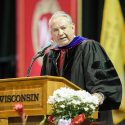Tess Hauser was ‘heart and soul’ of Wisconsin Longitudinal Study
Taissa S. “Tess” Hauser, a key scientific figure in one of the longest and most respected sociological studies ever undertaken, passed away in Washington D.C. last month.
Taissa S. “Tess” Hauser
Hauser, 71, who retired in 2009, was a senior scientist in the University of Wisconsin–Madison’s Wisconsin Longitudinal Study.
The famed study has followed more than 10,000 graduates from the state’s high school class of 1957, profiling their life course, including education, career, family, aging and retirement.
Her husband, Robert Hauser, an emeritus UW–Madison sociology professor, directed the study for many years, where he worked side-by-side with his wife.
“Tess was, for 40 years, the heart and soul of the Wisconsin Longitudinal Study,” says Robert Hauser, now executive director of the Division of Behavioral and Social Sciences and Education at the National Research Council.
The Hausers were married for almost 50 years and have two sons.
“She was also my professional and scientific research collaborator, best friend, chief critic, and steady and faithful guide in all things both personal and professional,” he adds.
Tess Hauser’s work was central to the study’s success during a tenure that ran from 1969 to 2009. She made important scientific contributions to methods of survey research, including the development of procedures for the location of respondents in longitudinal studies that led to exceptional sample retention.
One of the most vexing problems for longitudinal surveys is sample attrition and non-response — the difficult challenge of maintaining the integrity of a survey sample over a long time period. Under Hauser’s leadership, the study maintained a nearly intact sample among living members during half a century.
Hauser’s work set new standards for the field of longitudinal survey research with a system and accompanying procedures for the location of respondents in longitudinal studies, which resulted in a 98 percent success rate.
Carol Roan, the current director of the study, says Tess Hauser assembled and created thousands of pages of data to document the WLS data.
“This might sound like a trivial thing but these papers are really important and tremendously useful for current project staff,” Roan says. “But her legacy is also captured by remembering her gentle mentoring of the students and staff that worked on the WLS project over the past 40 years.”
Tess Hauser also created specialized computer software for archiving longitudinal research data, and she designed and implemented systems for the storage and analysis of confidential Social Security earnings data that demanded a high level of protection.
Beyond that, her husband says, she shared her knowledge freely with students and colleagues.
“She was a master at mentoring undergraduate and graduate students, post-doctoral researchers, academic staff, and faculty in the Department of Sociology across her many years of service,” he says.
In recognition of these extensive contributions, Tess Hauser was awarded the Judith S. Craig Distinguished Service Award by the College of Letters and Science in 2003.
Jennifer Sheridan, executive and research director for the Women in Science and Engineering Leadership Institute on campus, worked with Tess Hauser for seven years as a graduate student.
“She had a way of focusing on the whole student’s life – not just the academic part of that life – which made her a much-needed mentor to me as I was learning to integrate a demanding academic program with my demanding family life,” Sheridan says.
Joe Savard, a programmer and analyst at WLS, says Tess Hauser had a defining influence on his career.
“Her strength, her intellect, her loyalty and her compassion influenced me in such a profound way,” Savard says. “I can honestly say, without Tess’ patience and mentorship, I wouldn’t be who I am today. And, I’m not alone. She gave so much to so many.”
Subscribe to Wisconsin Ideas
Want more stories of the Wisconsin Idea in action? Sign-up for our monthly e-newsletter highlighting how Badgers are taking their education and research beyond the boundaries of the classroom to improve lives.



